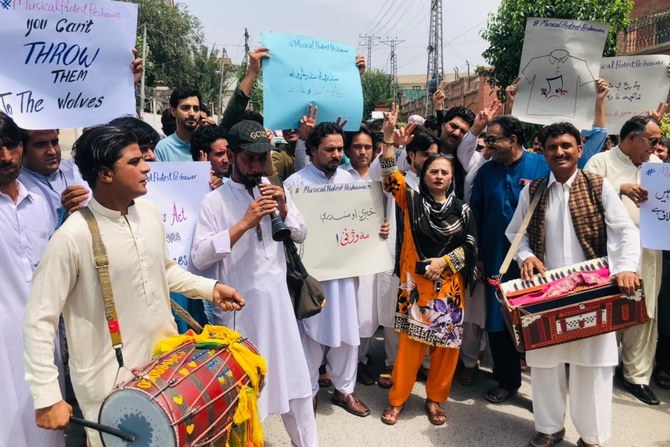PESHAWAR: Pakistani musicians on Monday held a protest in the northwestern city of Peshawar against last week’s arrest of four Afghan singers for not having adequate travel documentation, urging authorities to issue them special permits to stay in Pakistan on humanitarian grounds.
Several Afghan musicians crossed over into Pakistan after the Taliban seized Kabul in August 2021, fearing violence and persecution from a group that had banned music during a previous stint in government from 1996 till 2001.
Since its takeover of Afghanistan, the Taliban have issued several edicts that have rattled foreign governments and women and minorities in the country and are seen as a rollback of freedoms Afghans have for decades fought to achieve. Among the austere measures are the Taliban’s refusal to open girls’ high schools, and a ban on women travelling alone inside the country or on foreign trips. The group has also recently ordered women to cover their faces in public.
The dangers specifically facing musicians in Afghanistan were brutally highlighted in the final months of the Taliban insurgency, when the group carried out targeted attacks on those it said had betrayed its vision of Islamic rule.
“Police in an overnight raid picked up four Afghan singers, which is a matter of serious concern for all musicians of the province,” Rashid Khan, president of a Pashto literary and cultural organization in Khyber Pakhtunkhwa (KP) province, told Arab News.
“We demand authorities look into their cases on compassionate grounds and allow them [the singers] to live here by providing them special identity cards,” he said. “Otherwise, you are sending them straight to a death cell if you decide to deport them.”
Khan said Pakistani musicians planned to march to Islamabad to ensure the release of their Afghan colleagues:
“Our prime demand is that they should not be deported to Afghanistan under the current circumstances.”

Carrying placards, Pakistani musicians and civil society members protest the arrest of Afghan singers in Peshawar, Pakistan, on May 30, 2022. (AN Photo)
Haroon Rashid, a senior police official in Peshawar, said the singers were detained last week after the police received complaints they did not have the adequate documents to live in Pakistan, which shares a 2,670-kilometer-long porous border with Afghanistan.
“Naturally, we had to arrest those who had no legal documents,” said the officer. “The Afghan singers have been detained under Clause 14 of The Foreigners Act. Their cases are now in a court which will decide their fate.”
The Foreigners Act says: “Any person knowingly enters into Pakistan illegally, he shall be guilty of an offence under this Act and shall be punished with imprisonment for a term which may extend to ten years and fine which may extend to ten thousand rupees.”
Under the law, illegal residents can be deported with the consent of the federal government and permission of the court trying them.

Holding placards, Pakistani musicians and civil society members protest the arrest of Afghan singers in Peshawar, Pakistan, on May 30, 2022. (AN Photo)
Tariq Afghan, a senior lawyer representing the detainees, told Arab News he was hopeful of their release on bail.
“We will convince the court not to send them back as it could jeopardize their lives,” he said. “After securing their bail, we plan to make some arrangements to ensure they get some special permits to live in Pakistan.”
But even in Pakistan, the future looks grim for Afghan musicians and singers, particularly in the country’s northwest, where the music industry has been badly hurt by years of militant violence and the coronavirus pandemic.
The Pakistani Taliban, a separate movement that shares common roots with the Afghan Taliban, have killed at least 13 prominent artists, including female Pashto singers, in the Khyber Pakhtunkhwa province between 2008 and 2017, according to a report published by English-language newspaper The News.















